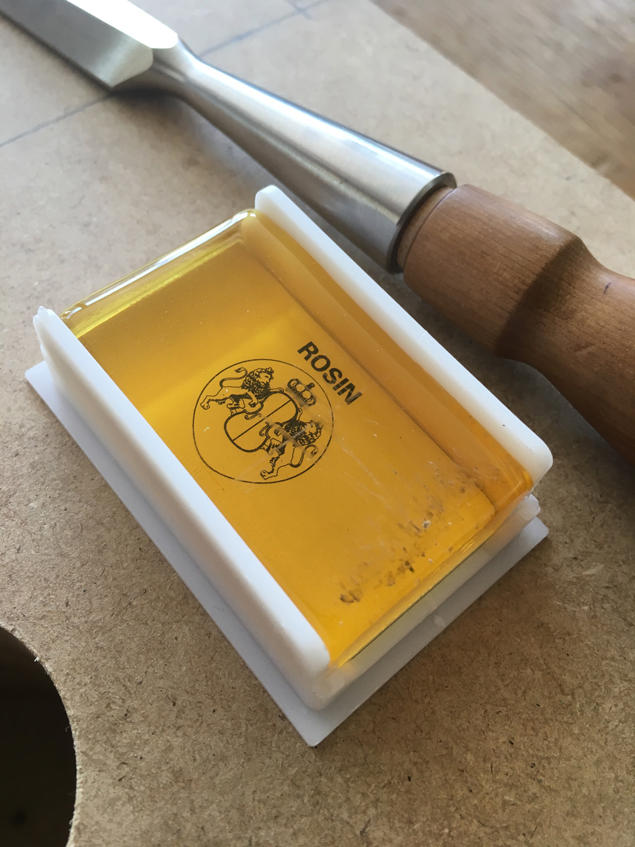We may receive a commission when you use our affiliate links. However, this does not impact our recommendations.
 I’m a bit ashamed of how long it took me to buy an inexpensive block of rosin and put it in my tool chest. Rosin, also called calophony, is derived from pine sap and increases friction on anything you rub it upon. That means that your slippery bench dogs or planing stop will suddenly stand at attention and stay that way. Rosin makes things stick.
I’m a bit ashamed of how long it took me to buy an inexpensive block of rosin and put it in my tool chest. Rosin, also called calophony, is derived from pine sap and increases friction on anything you rub it upon. That means that your slippery bench dogs or planing stop will suddenly stand at attention and stay that way. Rosin makes things stick.
It comes in a variety of colors, prices and confusing characteristics – that’s because it is used in the music trade for stringed instruments. I’ve tried out a variety of rosin blocks – dark, light and in between. I haven’t found much difference for the woodworker.
So buy a small block to give it a try. I bought two blocks for $6 to try it out. I destroyed the first block by using too much pressure to apply it. Rosin is brittle. Press hard and the block will shatter like rock candy. After destroying that first block of rosin ($3, argh!), I took it easy with the second. Rub the block on your work with light pressure. Cradle the block with your hands to warm it up with your body temperature.
When you do it right, it will leave a slightly (very slightly) sticky surface behind. Experiment a bit with the stuff before you go to town. You will quickly figure out that a few rubs with warm rosin will fix most problems where things are slipping.
Once again, this is a gift from the forest, much like the unending supply of timber we enjoy. Don’t take it for granted.
— Christopher Schwarz
Here are some supplies and tools we find essential in our everyday work around the shop. We may receive a commission from sales referred by our links; however, we have carefully selected these products for their usefulness and quality.









Used in the country in winter when you kill a pig to get rid of the hairs!
I’ve been using cello rosin on the drive belts/wheels of my treadle lathe and velocipede scroll saw. The rosin really makes the knotted rope drive belt stick in the V belt pulleys of the treadle lathe. The scroll saw is driven by a leather belt, and the rosin really puts a stick on the drive wheel.
Super! I have a two pound “blob” of amber rosin found by a hunter near the remains of a turpentine distillery. Pretty cool to look at and always a conversation starter. Only thing missing is bug frozen inside. LOL
Double bass rosin is worth a try. Its a little softer and stickier than the violin types.
Gunsmiths use powdered rosin to keep scope tubes from sliding in their mounts from the sharp recoil when firing. The scope tubes are very thin and can be dented by the mounts if you try to arrest movement using clamping force. Just a tiny sprinkle of powdered rosin and they will not move. The same trick can be used anywhere you have problems with two metal surfaces slipping when you don’t want them too, but you don’t want to lean on the wrench or screwdriver.
Musicians use block rosin, athletes use bags filled with powdered rosin.
Nice tip and excellent stocking stuffer!
For hammer handles and planing stops, I use Pine tar sticks. A little messy but much stickier than just rosin.in the old days, guys used liguid pine tar in cold weather on their gloves and hammers and purple ski climbing wax.
For hammer handles and planing stops, I use Pine tar sticks. A little messy but much stickier than just rosin.in the old days, guys used liguid pine tar in cold weather on their gloves and purple ski wax.
I’ve been using a sports rosin bag for years. I keep it in a zip-lok bag, and occasionally lightly rub my hands with rosin to grip woodcarving knives better. You can also use it to grip a hammer.